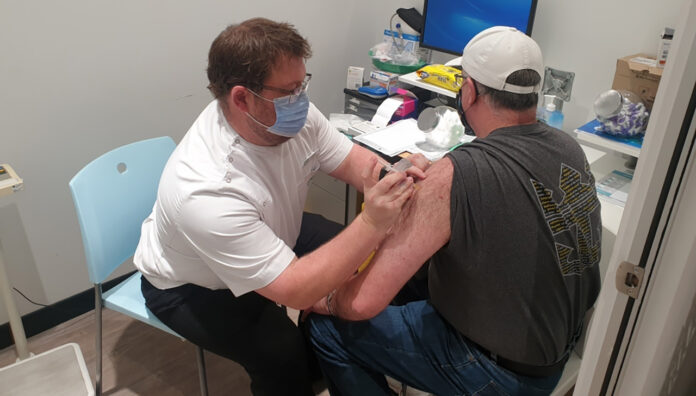As the virus continues to spread through New South Wales, pharmacists have been approved en masse to vaccinate the nation.
With 3,500 community pharmacists across the country approved to start vaccinating patients by month’s end, community pharmacists will be the first to offer the Moderna vaccine in September, which was provisionally approved by the Therapeutic Goods Administration on Monday.
In Queensland, however, it’s all systems go, with 530 now offering the vaccine. In a show of support, the state’s Health Minister Yvette D’ath received her second dose of AstraZeneca from a pharmacist last Friday.
COVID-19 cases updates
|
Getting vaccines to Queensland’s pharmacists
In response to the burgeoning COVID-19 outbreak in Queensland, Lisa Nissen FPS, Senior Expert Advisor, Pharmacy for Queensland Health’s (QH), sprang into action to facilitate the pharmacy rollout process.
‘There were a total of 22,600 doses of AstraZeneca provided from the Queensland Health allocation to a subgroup of the MMM1 (outside metropolitan regions) pharmacies that had been onboarded through the Commonwealth,’ Ms Nissen told Australian Pharmacist.
‘We identified, given the lockdown and Delta [variant] threat in Queensland, that the increased availability of vaccination sites in [the] south east would add value to our overall strategy.’
Knowing that pharmacies would not receive supplies for more than a week at the minimum, QH acted quickly to provide the allocated doses to 113 pharmacies the day after they were onboarded by the Commonwealth.
This has been one of the most rapid site initiations of the COVID-19 vaccine rollout to date, allowing community pharmacists to start vaccinating from that afternoon.
‘We were able to turn the whole process around in 24 hours,’ Ms Nissen said. ‘It was a fantastic team effort.’
Furthermore, it is a clear demonstration of the great working relationship QH has with community pharmacists in the state, and is indicative of the tremendous contribution pharmacists will continue to play in the COVID-19 vaccine rollout.
‘We can see in the data that the uptake has been great in the community,’ Ms Nissen said.
‘With the final group of MMM1 sites coming on board this week, [we] should have over 700 pharmacies offering vaccines across the state.’
Vaccinations on the coast
As one of the first pharmacists on the NSW Central Coast to offer the COVID-19 vaccine on 5 August, Dale Richardson MPS is encouraged by the community response.
While most patients (60%) who come through the pharmacy doors are aged over 60, younger patients are also keen to get vaccinated.
‘A lot of them have already had the discussion with their [GP], who told them to just get it done,’ Mr Richardson told AP. ‘And they trust the judgment of their doctor and pharmacist.’
Despite being a lockdown area, much of the region’s Pfizer vaccines were diverted to Sydney following the Government’s quest to return Year 12 students to school.
‘I think they cancelled about 2 weeks worth of patients,’ Mr Richardson said.
As a result, he has vaccinated patients who don’t want to wait for the region’s Pfizer supply to be replenished.
‘They have really gone out of their way to get the AstraZeneca vaccine,’ he added.
Extended counselling time
One of the things that sets the COVID-19 vaccination process apart from others is the length of counselling time required, Mr Richardson has learned. In most cases, the entire allotted 15-minute appointment has been used, often to address the questions of concerned patients.
‘They just want more understanding of what’s being said in the media,’ he said.
Questions typically revolve around why the AstraZeneca vaccine is known to cause blood clots and the Pfizer isn’t, expected adverse effects, and the reason behind the second dose timing change.
In terms of the time frame, Mr Richardson explains that while clinical trials indicated a 12-week interval provides the best immune response, the escalating COVID-19 crisis requires more vaccines in arms sooner.
To address questions around clotting, Mr Richardson emphasises how small the risk is in the greater scheme of things.
‘I explain the reason we’re picking up things like [clotting] is because everyone’s getting it done at once,’ he said.
‘If the whole country [was given] the same prescription medicine, rare [adverse] effects would pop up.’
But to ensure patients are prepared in the case of rare clotting incidents, Mr Richardson goes through the identifying symptoms so they can be detected early.
‘I tell them, “If you do get treatment, your chances of dying are really small, even smaller than just getting [a clot] in the first place.’



 Professor Margie Danchin[/caption]
Professor Margie Danchin[/caption]

 Dr Peter Tenni[/caption]
Dr Peter Tenni[/caption]
 How should we deprescribe gabapentinoids, according to the Maudsley Deprescribing Guidelines[/caption]
How should we deprescribe gabapentinoids, according to the Maudsley Deprescribing Guidelines[/caption]



 Pharmacists have always prescribed, but they have the potential to prescribe much more
Pharmacists have always prescribed, but they have the potential to prescribe much more




